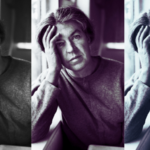It was back in 2015, on one of those gloomy mornings you often have in Norway at the end of November. I was on my way to give yet another writing workshop in the high security prison near my home town, Halden. One week this time, full days.
Since the very first time I held a workshop in prison, I’ve felt a strong affinity between literature and prisons. Time to think, obviously, but also the lack of meaning behind the bars, which makes some prisoners ask questions about life that often don’t occur in the mind of a regular passer-by on the street, but that are at the very core of literature. Questions like “What is time?” or “What does ‘good’ and ‘evil’ really mean?” or “How do I deal with my mistakes?” When I talk with inmates about their lives—often dramatic and painful, dancing on the razor’s edge—I realize they’ve barely talked about their life as freely as they can through the task of writing. Either they’ve told their crimes to brag or to scare other inmates, positioning themselves in the criminal hierarchy. Or they might have told a version of their story in court, trying to twist themselves out of guilt. The language of law might be interesting enough, but it doesn’t leave much space for the complexity of inner processes. There are more questions to ask when it comes to life, other than guilty or not guilty, so I leave the act of judgment to the courts, and focus on everything else.
I entered the mouth of the huge concrete wall, swept my bag through the x-ray machine and walked through security. I was accompanied by an officer to the prison school section and met the class of about twenty inmates. When I started to talk, I noticed, once again, that the words have a different weight in prison. As if even gravity bends its laws to mess with you. I went through my first lecture, on observation, without taking particular notice of Ishaq, who sat in the middle of the room, wearing this black woolen cap with the brim pulled down, right above his fatigued eyes. At that point, he was just one of the inmates in the writing class, not saying much, polite, attentive, no fuzz, just there.
On the second half of each day, I would let the prisoners write independently, while I walked around and spoke with them one-to-one. As I went from one to the other, giving feedback on their stories, I finally got to the guy with the black cap. It must have been on the fourth day, and still he had nothing on the paper in front of him. Not one word. “But I do have a story,” he affirmed. “Well, good for you”, I said, “Then get started”. Still, he didn’t move, told me it wasn’t that easy, that he needed help, there was too much chaos in his head.
I saw where he was heading. It’s not the first time I’ve been asked to write someone else’s story. I guess most writers get that question now and then, and usually I would tell people they should write their story themselves. So it was merely out of politeness, and perhaps a hint of curiosity, that I asked what he had to share. “I went to Syria to fight”, he said. Right there, for a second, I felt ambushed by my own associations. This was in 2015, not many weeks after the attack on Bataclan concert hall in Paris. I remember, in those days, that I would always take notice of the emergency exit when I was at a concert or in the theatre. In Europe, it was a time of fear. In my mind, going to Syria probably meant joining the Islamic State, and that again, probably meant supporting terror and brutality, even in Europe. Yet, rather than feeling repulsion, I was struck by a feeling of responsibility. I knew that this wasn’t normal. I knew that people who have experienced war seldom talk much about it, let alone someone who has been fighting with the islamists in Syria. You can risk getting into trouble in all kinds of ways by saying too much, either with the islamists, if they feel you’ve snitched, or with the police intelligence, if they can tag more paragraphs on you. And then, you can put people you love in trouble too. So I knew sources like this were rare, not just in Norway, but anywhere. This vacuum of sources and stories, had made the ‘foreign fighter’ into a mystery, which gave way for sensationalist journalists, polarizing politicians and even the Islamic State themselves, to depict the black-and-white story they all fed on for different purposes. But as we know, wherever there are humans, there is complexity. I was curious to know what was behind the black-and-white imagery that roamed the news, and understand what had made someone willing to pay the ultimate price for a cause in a rather remote country. So I said yes. “I want to write your story.”
***
After two months of intensive study of Islam, Islamism and the Syrian War, I returned to prison to begin what would become a 150 hour long interview spread out over ten months. At first, we were both suspicious of one another. Although he had asked me to help put his story together, he didn’t really trust me at first. “I don’t trust anyone”, he would say, “not after what I’ve been through”. He was worried he would get other people into trouble with this. His family. Former friends. He didn’t want to create problems for anyone. We figured out it would be easier if it took the shape of a novel, we could use the veil of fiction, transform and reshape characters and places, but with an honest core, true to the human experience he’d been through. Then, things started to melt and flow, and he would tell more and more. Curious, how lying sometimes gets you closer to truth.
I had no way of crosschecking most of what he said. I had read his court file, where he was condemned for partaking in terrorist organizations. It was, however, bafflingly vague…I, on the other hand, also had my doubts. I sometimes wondered if the things he told me were true or not. This got particularly sticky when we worked on the second part of the book, when he talked about what he’d experienced in Syria. I had no way of crosschecking most of what he said. I had read his court file, where he was condemned for partaking in terrorist organizations. It was, however, bafflingly vague, stating that he had been a part of The Islamic State and/or the Al-Qaeda affiliated group, Jabath al-Nusra. This “and/or” didn’t seem very convincing to me for a court verdict, but neither did the story Ishaq told. Did he really not fire a single shot from his gun? Did he not swear allegiance to any group? Was he only “visiting” the Islamic State territories? I confronted him over and over, and although his answers were pretty robust, I was certain I didn’t have the full picture. I knew most of what he had told me was probably true, there’s no reason to believe he didn’t drive around in an ambulance to help injured soldiers at the front line. But what about all the things he hadn’t told me? The frustration grew to the point where I almost cancelled the whole book.
I had to remind myself of the reason I had gone to give writing classes in prison in the first place, that law and literature is not the same. My goal was not to deem someone guilty or not, that had already been taken care of. I was there to understand a human process. Not to judge, but grasp the complexity. As I read through what he actually had told me, I realized he had already shared a whole lot. He had talked about all the tiny steps that had brought him to the decision of leaving for Syria, from his upbringing between Norwegian and Pakistani culture with a father in jail, to his wannabe gangster youth to his religious awakening. All along the way, he had talked about what had moved him, what had made him doubt, what had confused him. He had even given a horrifying account of what the frontlines of Syria looked like in 2013, through the eyes of a discombobulated rebel. And when I flipped through my notebook again, I even saw that he had told me, as he got to the point where he crossed the border to Syria, that from now on, I wouldn’t completely know what was true and not. I understood that Ishaq was telling me as much as he could, and he had even announced his dishonesty in a very honest way. So I gave up the idea of knowing everything, settled with the intense and vulnerable story that was already there, and kept that key phrase for the book: “From now on you won’t know what is true and not.”
The point with the book, after all, was not to document Ishaq’s life, but to create problems for the reader. In short, I want the reader to deal with the same problems as I had to deal with, when I was sitting there all those hours, on the same couch as someone who had taken a very different path in life than myself, someone other. The form of the book therefore had to be a dialogue, except my own questions are left out as blank lines. By doing so, I invite the reader to sit there on that couch, inside the prison, which is inside the literature. Inside the truth, which is inside the fiction.

















